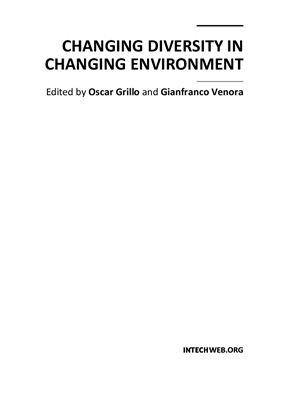InTech. 2011. 402 p.
As everybody knows, the dynamic interactions between biotic and abiotic factors, as well as the anthropic ones, considerably affect global climate changes and consequently biology, ecology and distribution of life forms of our planet. These important natural events affect all ecosystems, causing important changes on biodiversity. Systematic and phylogenetic studies, biogeographic distribution analysis and evaluations of diversity richness are focal topics of this book written by inteational experts, some even considering economical effects and future perspectives on the managing and conservation plans.
Contents
Preface
Examination and Comparison of Microbial Diversity in Field-Scale Sewage Sludge Composters
Food Microbiota Diversity
Describing Parasite Biodiversity: The Case of the Helminth Fauna of Wildlife Vertebrates in Mexico
Yeasts Biodiversity and Its Significance: Case Studies in Natural and Human-Related Environments, Ex Situ Preservation, Applications and Challenges
Polychaeta Diversity in the Continental Shelf Off the Orinoco River Delta, Venezuela
Butterfly Diversity in a Changing Scenario
Bee Diversity in Thailand and the Applications of Bee Products
South African Spider Diversity: African Perspectives on the Conservation of a Mega-Diverse Group
Relationships Between Bird Species Richness and Natural and Modified Habitat in Southe Mexico
Anuran Amphibians: A Huge and Threatened Factory of a Variety of Active Peptides with Potential Nanobiotechnological Applications
Brine Shrimp Diversity in China Based on DNA Barcoding in the Face of Amphibian Decline
Fishes of the Atlantic Rain Forest Streams: Ecological Pattes and Conservation
Diversification of Circum-Mediterranean Barbels
Biogeography and Population Connectivity of Coral Reef Fishes
Diversity of Wild Mammals in a Megalopolis: Mexico City, Mexico
Microbial Biodiversity and Biogeography on the Deep Seafloor
Natural Selection: Finding Specimens in a Natural History Collection
As everybody knows, the dynamic interactions between biotic and abiotic factors, as well as the anthropic ones, considerably affect global climate changes and consequently biology, ecology and distribution of life forms of our planet. These important natural events affect all ecosystems, causing important changes on biodiversity. Systematic and phylogenetic studies, biogeographic distribution analysis and evaluations of diversity richness are focal topics of this book written by inteational experts, some even considering economical effects and future perspectives on the managing and conservation plans.
Contents
Preface
Examination and Comparison of Microbial Diversity in Field-Scale Sewage Sludge Composters
Food Microbiota Diversity
Describing Parasite Biodiversity: The Case of the Helminth Fauna of Wildlife Vertebrates in Mexico
Yeasts Biodiversity and Its Significance: Case Studies in Natural and Human-Related Environments, Ex Situ Preservation, Applications and Challenges
Polychaeta Diversity in the Continental Shelf Off the Orinoco River Delta, Venezuela
Butterfly Diversity in a Changing Scenario
Bee Diversity in Thailand and the Applications of Bee Products
South African Spider Diversity: African Perspectives on the Conservation of a Mega-Diverse Group
Relationships Between Bird Species Richness and Natural and Modified Habitat in Southe Mexico
Anuran Amphibians: A Huge and Threatened Factory of a Variety of Active Peptides with Potential Nanobiotechnological Applications
Brine Shrimp Diversity in China Based on DNA Barcoding in the Face of Amphibian Decline
Fishes of the Atlantic Rain Forest Streams: Ecological Pattes and Conservation
Diversification of Circum-Mediterranean Barbels
Biogeography and Population Connectivity of Coral Reef Fishes
Diversity of Wild Mammals in a Megalopolis: Mexico City, Mexico
Microbial Biodiversity and Biogeography on the Deep Seafloor
Natural Selection: Finding Specimens in a Natural History Collection

